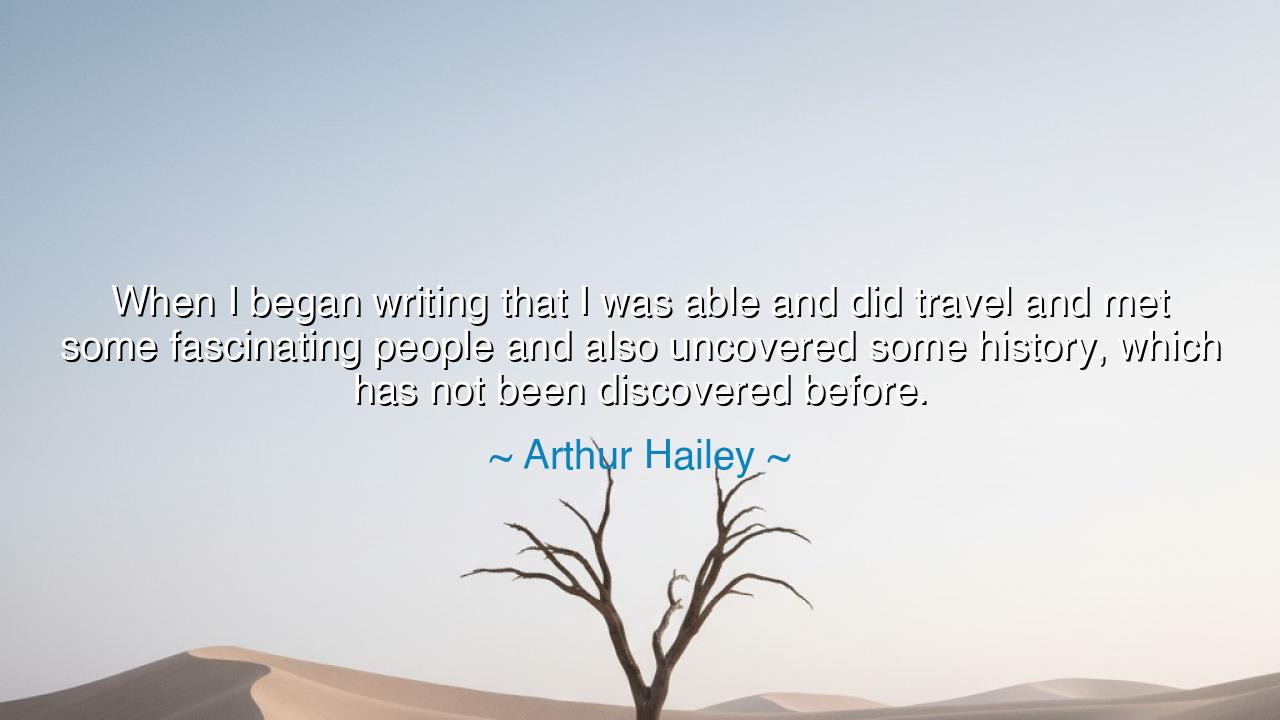
When I began writing that I was able and did travel and met some
When I began writing that I was able and did travel and met some fascinating people and also uncovered some history, which has not been discovered before.






So spoke Arthur Hailey, master of the pen and creator of great tales, when he declared: “When I began writing that I was able and did travel and met some fascinating people and also uncovered some history, which has not been discovered before.” His words reveal not only the craft of the writer, but the sacred journey of the seeker—the one who ventures beyond the familiar in search of stories, wisdom, and hidden truths that lie waiting beneath the surface of the world.
To write is not to remain still, enclosed within one’s room, but to step forth into the vast theater of life. Hailey reminds us that travel is both the body’s movement and the soul’s awakening. For the writer who walks among strangers, who listens to voices far from home, who treads roads that others pass by, gathers more than scenery. He gathers the essence of humanity itself. Through such journeys, he met “fascinating people,” souls carrying wisdom, struggle, and triumph within their lives. These encounters became the sparks that set his writing aflame.
The uncovering of history is the writer’s noblest labor. For history is not always written in books or carved in monuments. It lives in the forgotten tale of the worker, in the memories of the old, in the hidden places where truth lies buried under dust. Hailey knew that by stepping beyond the obvious, by digging deeper, he could uncover that which had “not been discovered before.” And in doing so, he joined the company of all true chroniclers—the Herodotus who wandered lands to record customs, the Thucydides who preserved the lessons of war, the storytellers who gave voice to those history would otherwise forget.
A parallel may be seen in the life of Mark Twain, who traveled the Mississippi, the West, and the world, and through his journeys gave us works that remain alive even now. His pen was sharpened by his feet, his tales enriched by the people he met. Without travel, his words would have lacked the pulse of reality. Without listening to the voices of the forgotten, he could never have uncovered the deeper history that shaped the American soul.
From Hailey’s confession we learn this: that the art of creation, whether in writing, teaching, or any craft, requires leaving the comfort of one’s own narrow world. The treasures of the mind are found in the wide horizon, in the lives of others, in the uncharted corners of truth. To remain enclosed is to recycle what is already known. To step forth is to encounter the undiscovered, and to bring back light for others to see.
The lesson is clear: if you would create, you must also travel. Not all journeys require oceans and nations; some can be as close as listening deeply to a neighbor, exploring the forgotten streets of your city, or reading the memories of another time. But you must be willing to move beyond yourself. Seek the “fascinating people” who carry stories within them. Search for the history that lies unspoken, waiting to be uncovered.
Practically, this means opening your life to discovery. Speak to those outside your circle. Ask questions of elders whose stories may vanish if unheard. Read widely, walk widely, listen widely. Then, with pen or voice or heart, share what you find, so that others may be enriched by truths they might never discover on their own.
Thus, Arthur Hailey’s words stand as both testimony and teaching: “When I began writing… I did travel and met fascinating people and uncovered history not discovered before.” Let us walk as he did—seeking, uncovering, and bringing forth new light. For the world is vast, and truth is endless, but only those who dare to journey beyond themselves will carry back the treasures that endure.






AAdministratorAdministrator
Welcome, honored guests. Please leave a comment, we will respond soon